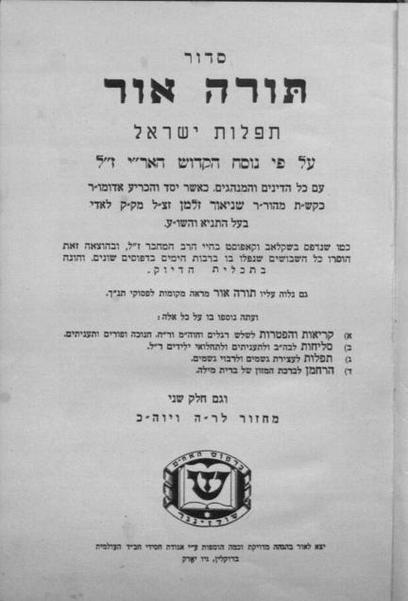| Source (Yiddish) | Translation (Hebrew) | Translation (English) |
|---|---|---|
גוט מאָרגן דיר, רִבּוֹנוֹ שֶׁל עוֹלָם! איך, לֵוִי־יִצְחָק בֶּן־שָׂרָה מבערדיטשעװ בין צו דיר געקומען מיט אַ דִין תּוֹרָה פֿאַר דיין פֿאָלק יִשְׂרָאֵל |
צַפְרָא טָבָא לְךָ רִבּוֹנוֹ שֶׁל עוֹלָם אֲנִי, לֵוִי־יִצְחָק בֶּן־שָׂרָה מִבֶּרְדִיצֶ׳ב, בָּאתִי אֵלֶיךָ בַּדִּין תּוֹרָה מִצַּד עַמְּךָ יִשְׂרָאֵל |
Good morning to you, Master of the World, I, Levi Yitsḥaq, son of Sarah of Berdichev, I come to you with a Din Torah from your people Yisrael. |
און װאָס האָסטו צו דיין פֿאָלק יִשְׂרָאֵל? און וואָס האָסטו אָנגעזעצט אויף דיין פֿאָלק יִשְׂרָאֵל? אַז װאָס נאָר אַ זאַך, איז ”צַו אֶת בְּנֵי־יִשְׂרָאֵל,“ און װאָס נאָר אַ זאַך, איז ”אֱמֹר לִבְנֵי־יִשְׂרָאֵל,“ און װי נאָר אַ זאַך, איז ”דַּבֵּר לִבְנֵי־יִשְׂרָאֵל.“ |
מָה לְךָ אֵצֶל עַמְּךָ יִשְׂרָאֵל? לָמָּה הִטַּלְתָּ עַצְמְךָ עַל עַמְּךָ יִשְׂרָאֵל בְּכָל עִנְיָן שֶׁהוּא ”צַו אֶת בְּנֵי־יִשְׂרָאֵל“ (בְּכָל עִנְיָן שֶׁהוּא ”אֱמֹר אֶל־בְּנֵי־יִשְׂרָאֵל“)[1] Line added from other nusḥaot to correspond with the Yiddish. בְּכָל עִנְיָן שֶׁהוּא ”דַּבֵּר אֶל בְּנֵי־יִשְׂרָאֵל“ |
What do you want of your people Yisrael? What have you demanded of your people Yisrael? For everywhere I look it says, “Say to Bnei Yisrael.” And every other verse says, “Speak to Bnei Yisrael.” And over and over, “Command Bnei Yisrael.” |
טאַטעניו! כַּמָּה אֻמּוֹת בָּעוֹלָם! בַּבְלִיִּים, פָּרְסִיִּים, אֲדֹמִיִּים און די רוסלענדער, װאָס זאָגן? ”אונזער קייזער איז אַ קייזער!“ די דייטשלענדער, װאָס זאָגן זײ? ”אונזער קעניג איז אַ קעניג!“ די ענגלענדער, װאָס זאָגן זײ? ”אונזער מלכות איז אַ מלכות!“ און איך, לֵוִי־יִצְחָק בֶּן־שָׂרָה מבערדיטשעװ זאָג׃ ”יִתְגַּדַּל וְיִתְקַדַּשׁ שְׁמֵהּ רַבָּא!“ |
אָב הָרַחֲמָן, כַּמָּה אֻמּוֹת יֵשׁ בָּעוֹלָם בַּבְלִיִּים, פָּרְסִיִּים, אֲדֹמִיִּים הָרוּסִים מָה הֵם אוֹמְרִים? הַקֵּיסָר שֶׁלָּהֶם הוּא קֵיסָר הַגֶּרְמָנִים מָה הֵם אוֹמְרִים? הַקֵּיסָר שֶׁלָּהֶם הוּא קֵיסָר וְהָאַנְגְּלִים מָה הֵם אוֹמְרִים? הַמַּלְכוּת שֶׁלָּהֶם הוּא קֵיסָר וַאֲנִי, לֵוִי־יִצְחָק בֶּן־שָׂרָה מִבֶּרְדִיצֶ׳ב אוֹמֵר: ”יִתְגַּדַּל וְיִתְקַדַּשׁ שְׁמֵהּ רַבָּא!“ |
Father, sweet Father in heaven, How many nations are there in the world? Babylonians, Persians, Edomites. The Russians, what do they say? That their Czar is the only ruler. The Prussians, what do they say? That their Kaiser is supreme. And the English, what do they say? That George the Third is sovereign. And I, Levi Yitsḥaq, son of Sarah of Berdichev, say, Yisgadal v’yisqadash shmei rabo “Magnified and sanctified is your Name.” |
און איך, לֵוִי־יִצְחָק בֶּן־שָׂרָה מבערדיטשעװ, זאָג׃ ”לֹא אָזוּז מִמְּקוֹמִי! כ’װעל זיך פֿון אָרט ניט רירן! אָן אַ סוֹף זאָל דאָס זיין! אָן אַן עק זאָל דאָס נעמען! יִתְגַּדַּל וְיִתְקַדַּשׁ שְׁמֵהּ רַבָּא!“ |
וַאֲנִי, לֵוִי־יִצְחָק בֶּן־שָׂרָה מִבֶּרְדִיצֶ׳ב אוֹמֵר: ”לֹא אָזוּז מִמְּקוֹמִי! מִמְּקוֹמִי לֹא אָזוּז עַד שֶׁיִּהְיֶה הַקֵּץ עַד שֶׁיִּהְיֶה סוֹף לְגָלוּת יִתְגַּדַּל וְיִתְקַדַּשׁ שְׁמֵהּ רַבָּא!“ |
And I, Levi Yitsḥaq, son of Sarah of Berdichev, say, “From my stand I will not waver, And from my place I shall not move Until there be an end to all this. Until there be an end to the exile! Yisgadal v’yisqadash shmei rabo ‘Magnified and sanctified is only your Name!'” |
This is “A Din Torah Mit Gott,” the Ḳaddish prayer of Rebbi Levi Yitsḥaq of Berditchev (1740-1810), in Yiddish with Hebrew, and English translations. Paul Robeson sang an adaptation of this prayer throughout his career and famously at his comeback concert at Carnegie Hall in 1958 after having been blacklisted in the early years of the Cold War (Cf. Jonathan Karp’s “Performing Black-Jewish Symbiosis: The “Hassidic Chant” of Paul Robeson“). The text of the Yiddish and Hebrew is adapted from the various nusḥaot provided at Zemereshet. The Hebrew mainly from Sefer haḤasidut (Warsaw: Di Welt 1922), p. 257-258. The Yiddish as transcribed by Yigal Landsman as his father, Hillel Landsman heard it from his father. –Aharon Varady
Source(s)
Notes
| 1 | Line added from other nusḥaot to correspond with the Yiddish. |
|---|

“אַ דִין־תּוֹרָה מיט גאָט | A Lawsuit with God, the ḳaddish prayer of Rebbi Levi Yitsḥaq of Berditchev in Yiddish, Hebrew, and English (ca. 18th c.)” is shared through the Open Siddur Project with a Creative Commons Attribution-ShareAlike 4.0 International copyleft license.

![Blue and white synagogue tile decorated with Moorish arch and floral motif and inscribed with the Hebrew word אתה “atah” (you), Morocco, 18th century. This tile is most likely from one of the four imperial cities: Fez, Meknes, Marrakesh, or Rabat. Original record notes that this tile came from a Moroccan synagogue. Possibly from the formula “barukh atah bevo’echa uvarukh ata btsetekha” (ברוך אתה בבואך וברוך אתה בצאתך), Deuteronomy 28:6; cf. tiled inscriptions in Lazama synagogue, Marrakech. (From the Magnes Museum collection, Tile [77-275].)](https://opensiddur.org/wp-content/uploads/2013/04/moorish-synagogue-tile-atah-morocco-ca-18th-c-250x250.png)








Leave a Reply